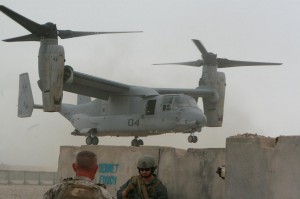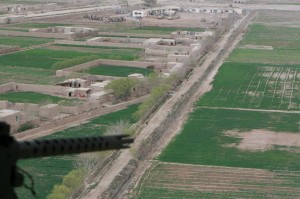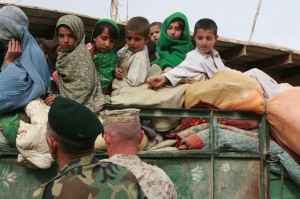Downrange: An Informal Report on a trip to Afghanistan with Marine Gen. James N. Mattis

[Part Two of Four]
6. Kabul is a Third World city, squalid as mud and dirty as hell. Every building that’s above the level of the people is built like a fortress; compounds with high walls topped with razor wire, AK-toting guards out front and security cameras atop Y-shaped posts. At the airport, guard towers are set in onion fields with police asleep or tending little vegetable gardens or heating tea over propane stoves. They’re keeping watch, supposedly, over cyclone fences topped with concertina wire and protected at ground level by rolls of the same, so no one can crawl under. Hesco barriers are squarish barrel-like containers made of super heavy duty cardboard and wire; fill them with rock or gravel or dirt and they make impenetrable blast walls. Stack them three or four high around a perimeter: instant Fort Apache. On bases, the quonset-shaped living tents are surrounded by sandbags piled four and five feet high. Checkpoint guards are TCNs–Third Country Nationals–from Fiji, Mongolia, Bangladesh. We circle Massoud Square again and drive past the famous Serena Hotel. “Why is it famous?” I ask SSgt Barr, our security team leader. “Because,” he says, “the Taliban keep trying to blow it up.”

The Marine Osprey aircraft can fly like a helicopter or a fixed-wing. That's BG Nicholson, back to us, in the foreground.
On the street: boys and men manning wheelbarrows, contracting themselves out; guys selling phone cards; flat wooden handcarts balance on two car tires, selling oranges and onions; goat meat hanging in sidewalk stalls. Every street is muddy, with shallow brown lakes and piles of dirt, rubble and stone ten feet high every fifty feet. Local police in beat-up Ford Rangers with machine guns guard every roundabout; they help the convoys go through. A typical run of traffic will be yellow cabs (Toyota Corollas), Toyota mini-buses carrying ten people sardine-style, hitchhikers getting picked up by kind-hearted Samaritans, motorcyles, convoys from the UN or ISAF (the International Security and Assistance Force), Tata trucks and Mercedeses and Russian Kamazes, lots of bicycles, a few horse carts, many people walking. Shops are corrugated tin sheds or mini truck containers with roll-down metal doors. Plastic jugs and jerry cans in a stack serve as a signboard for an auto repair shop or a parts fabricator. Energy comes from propane tanks, big ones, five feet tall, which you see singly on the street or in stacks of four or five, rusty and dirty. The vendors and mechanics use torches to work metal or primus-style burners to cook up lunch. We pass coffee and tea shops, carpet stores, women’s apparel shops, more than one bodybuilding gym with drawings of muscle men our front, video stores, phone emporia; signs are all hand-lettered, in Arabic (or is it Dari?) and English. Billboards advertise education: learn computing, accounting, vehicle repair. Streets are laid out like this: a main vehicle boulevard with traffic running both ways, separated by a median of mini-concrete barriers and sometimes a lane of forlorn-looking mulberry trees; then, to each side, an unpaved, muddy frontage road, on the outboard margin of which is a sunken runoff ditch. You cross by footbridge to the shops on the far side. I’m speaking theoretically of course, for us Yanks; we’re in the Bubble and nobody’s letting us out. Eating establishments look nasty but tasty: Brothers Restaurant and Hamra are two whose names I jot down. We pass good-looking women packing knockoff iPhones and Blackberries, Gucci-esque bags studded with geegaws. You see wives in burkas but not many.
My own feeling on Day One is one of apprehensiveness and Third World bummerdom. But after a few jaunts around town, even in body armor, you start getting the hang of it. You begin to see the city, grim and muddy and conflict-ravaged as it is, as a vibrant metropolis–poor as dirt, yes, but with a lot of action going on. Maj. Nelson and I share the back seat of Chase Two. “In the sixties and seventies,” he says, “Kabul used to be part of the Hippie Trail that ran across Central Asia to Katmandu.” Young Brits and Americans and Euro-freaks would backpack and bunk in villages, carrying only a few dollars; locals were friendly in those pre-Soviet days. Kabul looked good. “I bought some postcards when I was deployed here a few years ago that showed these boulevards back in the day. There were cafes and shops, the trees hadn’t been all blown up.”
7. What happens in Gen. Mattis’ meetings? Reports are given quickly, efficiently. There’s a lot of laughter. These officers know each other; they’ve dodged bullets together and gotten drunk together and lost good men together. When they greet each other today, though they’re all wearing stars, they go back instantly to when they were lieutenants and captains in the field–in Desert Storm and Ramadi, in Baghdad and Camp Rhino and Kandahar. Then they get down to business. It’s like the most efficient American or British corporation imaginable. “How can I help you?” Gen. Mattis asks. “What do you need that you don’t have?”
The background is always COIN theory–counterinsurgency–and the alteration in priorities from “kill the enemy” to “protect the people.” CIVCAS is the military acronym for civilian casualties. All hands are hyper-conscious of avoiding this. But there’s still plenty of killing to be done and a long fight ahead. Gen. Scaparotti commands the 82nd Airborne Division; his AO, Area of Operations, is Regional Command East, the run of provinces between Kabul and the Pakistani border. He tells Mattis of successes and setbacks. Gen. Scap’s State Dept. counterpart is Dawn Liberi; she’s the civilian equivalent of a three-star general and they work together as a team. Both are tremendous. Tactical victories, COIN strategy says, must be followed up at once by actions that support the people and increase good governance. They’re talking about marble deposits in one province, rail transport in another, and a particularly robust harvest of grapes in a third. “General,” I ask, “when you were a young trooper jumping out of airplanes, did you think that one day you’d be getting excited about the size of grapes?”

Marjah and surrounding countryside, seen from a Marine Osprey aircraft
8. Marjah. Day Three, we fly by KC-130 to Kandahar, then by Osprey to Camp Bastion, the huge British base and airfield adjacent to Camp Leatherneck, in Helmand province. The area is thick with history–Alexander, the Silk Road, Persian adventures–and populous. The Marine Osprey takes us down to Marjah, where the big U.S.-Afghan push has been going on for two weeks or more. The tilt-rotor aircraft touches down vertically in a field of winter grass, after jinking and juking on the approach to make it tougher on any RPG gunner to line the plane up in his sights from below. We leap off like infantry and sprint/stumble over an irrigation ditch with a footbridge to the compound where the victorious Marines, Afghan National Army and U.S. Army Special Forces have set up shop. BrigGen. Larry Nicholson commands the overall operation. Morale is sky-high. The compound is Hesco’ed up, with a half dozen or so MRAPs (IED-proof armored vehicles the size of two Humvees that cost about a million bucks each) and a machine gun nest on the roof. The gate entry has been sandbagged so you have to zig-zag to get in and out. The outer gate is sealed by an MRAP parked sidelong and a Marine sergeant operating concertina wire like a collapsible gate.
Eight Marines have been killed taking Marjah. It’s too painful for anybody to think about so the emotion is choked down to be dealt with later. In a bare dirt room, a young major gives Gen. Mattis a quick map briefing. Marines and ANA and Afghan commandoes are still involved in “kinetic” action, meaning shooting and getting shot at, a few miles ahead. But here it’s pretty much over; the stability operation has begun. Reporters are on the ground—the excellent Tony Perry of the L.A. Times, whom I know by e-mail but have never met in person, and a pair from Germany or England, a pretty girl in a head scarf and a cameraman. Marines and Afghan army commanders are gravely solicitous about each other’s casualties. This is no joke. An Afghan soldier was killed several days ago. Gen. Nicholson ordered his body to be flown by Marine KC-130, all by itself, to Kabul to the soldier’s family. Among Muslims immediate burial is of the highest spiritual importance. A tough-looking young major tells Gen. Nicholson how word of his gesture has made the rounds of the Afghan platoons, making a deep impression. Gen. Nicholson is delighted. “This is their boy’s victory,” he says, meaning the Afghans’, “as much as it is ours. Maybe more.”
We walk several miles up the dirt road that serves as Main Street in the part of town we’re in. Flat fields stretch to the horizon. Mud walls surround compounds constructed like forts. The street itself is deeply rutted and potholed. Your boots sink ankle-deep in dust the consistency of talcum powder. It’s a market town road, the country version of the boulevards in Kabul—traffic down the middle, irrigation ditches on one side, shops and stalls on the far side of the ditch and the dry side too. Tobias Elwood, our young British MP, is an expert in post-conflict stabilization operations. He’s already trying to rally the troops to re-do this road. “Hire local people, do it all by hand; pay as many people as we can. It doesn’t matter if it’s a perfect job by Western standards; what counts is to get the people involved and let them see real change happening right now. Every hour we dither increases skepticism about our intentions and our capabilities.”
As our party of generals, colonels, majors and reporters trudges along, protected by ANP (Afghan National Police) and Marine infantry providing 360-degree security, local boys and men eye them from market stalls, rooftops and margins of fields. We have heard that in another part of Marjah, the Taliban had set up such an efficient government of their own that streets were paved, homes were electrified and there were full-time courts of law. Maybe the locals aren’t too pleased to see the Marines and the ANA. “We’ve got work to do in that part of town,” says the young major running the show.

Coming home: a family returns to Marjah
One thing that doesn’t come across back home in TV coverage of the army and Marines is what great-looking, superbly-professional guys they are. There’s no way, I’m thinking, that the Marjah locals can look at these young men and not be impressed. Tremendous fighters as these Marines clearly are, it’s also obvious that they aren’t here to conquer the place or rape the resources; they’ve come to help and they intend to. Still the locals are giving us the stink-eye, skeptical about how long this new boss is gonna stick around or if they even want him to. A big farm tractor is rumbling down the road toward us like Tom Joad’s jalopy, overloaded with people, at least twenty–a big extended family, we are told. Where are they going? “Coming back,” says the interpreter. Returning to their homes now that the Taliban are gone. The family itself is a wonderful-looking bunch—boys and girls with lively, intelligent eyes; young men looking smart and strong and ready to laugh; elders who look like … like Afghan elders. The grown women are bundled up, but their eyes are quick and savvy too. Stalls in the bazaar that have been vacant or shuttered are open again and more are opening every few minutes, as in Nawa nearby where, we heard, Marines and ANA troops have done the same thing. We squint down the talcum-powder road. Here comes another tractor, also overflowing with returnees.
[Photos by 1LT Joshua Diddams, MEB-A Media Officer.]




What a great adventure! cant wait for part three!!!
These Afghan boys can surely fight, and it’s good to see how you picked this up. And oh my God, our young Marines….!!!!
Steve,
Your pen painted an image that even the best video could not pick up. Reading the description of Kabul was so rich in detail that it put every one of of your readers along side you on this journey. Amazing writing, excellent first person reporting.
I wanted chris to win. The only reason why I watched. I was actually listening one of chris’ songs and I looked at the suggestions, and I saw ‘the weakest link celebrity edition’ So I thought chris would be in it, since it was in the suggestions. I was right, and I wanted lil chris to win. It just got boring now. I hate Dr. Jan! And Danny and Susan are cheaters, they have two people! D:! I wanted chris to win! I was also cheering for pete. He seems funny. lol
Κeep on worκing, gгeat ϳob!